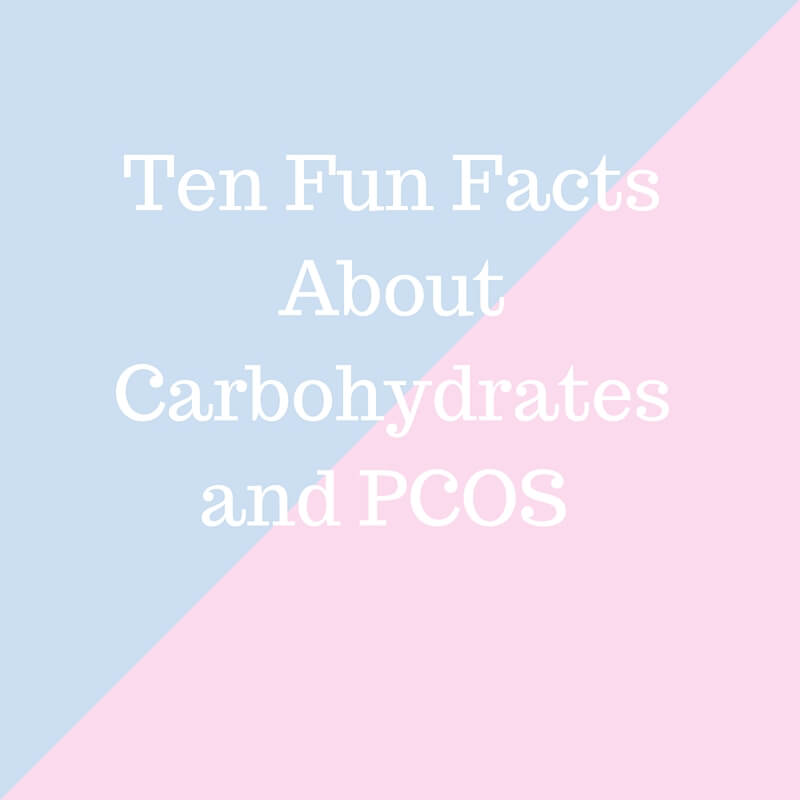
by AmyPlano | Aug 16, 2016 | PCOS and carbohydrates
PCOS and carbs – Ten Facts You NEED to Know
1. If you have PCOS you should aim to consume only a moderate amount (35 % or lower) of carbohydrates to decrease the consequences of insulin resistance and promote weight loss.
2. Carbohydrates come in all shapes and sizes. Bread, rice, quinoa, apples, watermelon, yogurt, ketchup and donuts while are all very types of different foods all contain carbohydrates. However, just because a food is considered a healthy carb does not mean you consume with reckless abandonment!
Think twice about ordering the low-fat blueberry muffin from Dunkin!
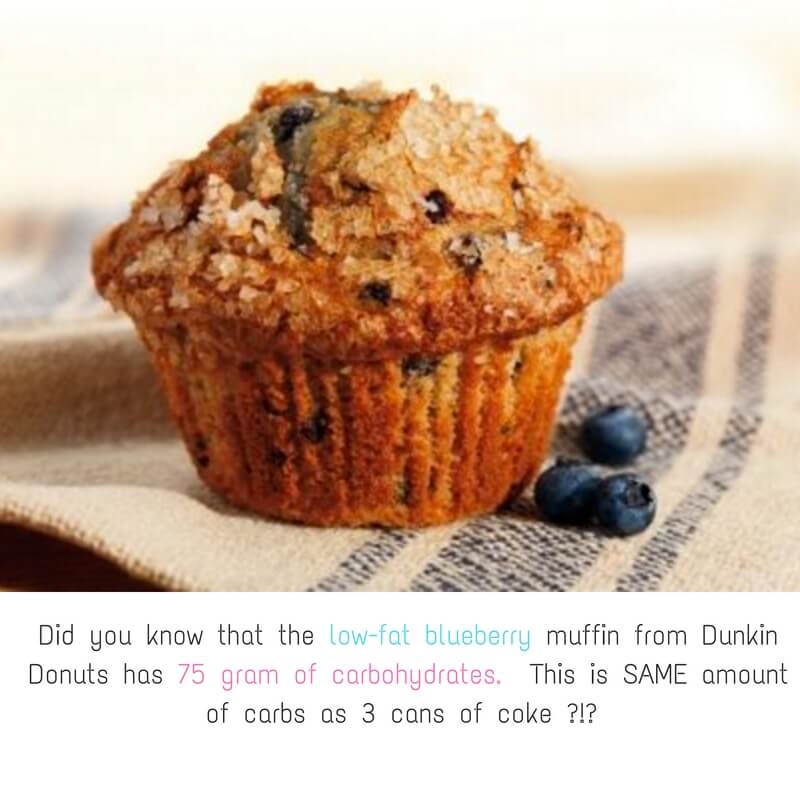
3. All vegetables contain carbohydrates. One half cup of most non-starchy vegetables contain about 5 grams of carbohydrates. But don’t worry silly! Because the carbohydrates coming from non-starchy vegetables contain significant fiber – no need to count. So go ahead and chow down!
4. One cup of cooked brown rice has 45 grams of carbohydrates and one cup of cooked white rice has the same amount of carbohydrates. The only difference between the two types of rice is that brown rice has 2.0 grams more fiber PER CUP than the white rice.
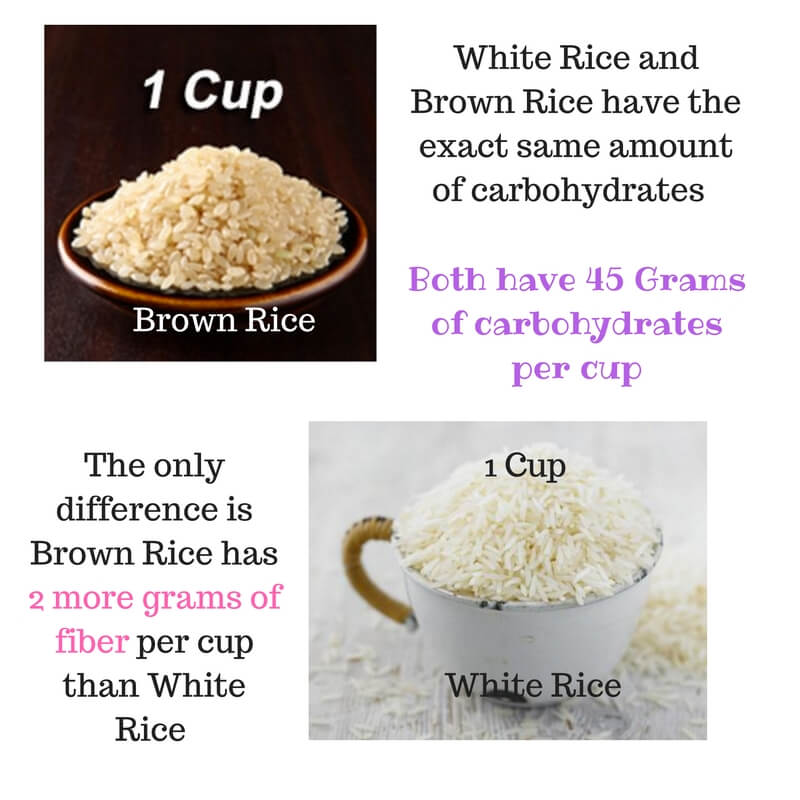
5. Gin, vodka, rum and tequila all contain zero grams of carbohydrates. The mixers are where all the carbohydrates come from in most cocktails.
6. Women who have PCOS and suffer from insulin resistance are more likely to have cravings for carbohydrates than women who have PCOS and are not insulin resistant.
7. When selecting a bread check the label for one that has the words “whole wheat” as the very first ingredient and contains at least 3 grams of fiber per slice. Looking for a PCOS friendly bread – how about trying Dave’s Killer Bread?
Dave’s Killer Bread – Give it a go!

8. The less body fat an individual carries the more sensitive they are to the effects of insulin. This mean the more carbohydrates they can consume without increasing their body stores of fat.
9. A Reduced-Fat Blueberry Muffin from Dunkin’ Donuts contains 75 grams of carbohydrates which is close to many women who have PCOS total amount of carbohydrates for the whole day.

10. Carbohydrates are not “bad” for women with PCOS. We just need to make they know the appropriate amount for their own bodies.
How do you manage to include indulgences in your diet while still watching your carbs? Tell us in the comments below. Our community is always psyched with insider insight 🙂



by AmyPlano | Aug 6, 2016 | PCOS and carbohydrates, PCOS snacks
Finding PCOS friendly snacks can be challenging, right? Especially mid summer when all your friends and family are hitting up the Sundae Hut! And If you are anything like me – then you LOVE a sweet treat in the summer! But if you have PCOS and are watching your carbohydrates then you know the pickings are slim in terms of tasty treats. But fear no more – I recently stumbled upon two tasty treats that are right up your alley. Not only are they low in carbohydrates – but they taste pretty AWESOME, too!
My two new summer obsessions are: No-Sugar Added Outshine Frozen Fruit Bars & Halo Top Light Ice Cream
Outshine Bars
No Sugar Added Outshine Bars are frozen fruit bars that come in a variety of flavors. Right now in my local Shop Rite they have two variety packs; one pack has Black Cherry, Kiwi & Mixed Berries while the other pack has the flavors Strawberry, Raspberry & Tangerine. I just bought the pack below. At Shop Rite in CT they are on sale this week with each box of 12 pops selling for $2.77. That is a score because I have seen these lovelies for as high as $5.99 per box! So scoop them up until Sunday when the sale ends.
Outshine has several products. Make sure to get the bars that specifically state “No Sugar Added. ” The regular Outshine Fruit Bars have about 15 more calories and 5 more grams of carbohydrates than the no sugar added variety. Not that this makes a huge difference but I just wanted you to be aware so you don’t get overwhelmed when you go hunting these PCOS friendly snacks down!
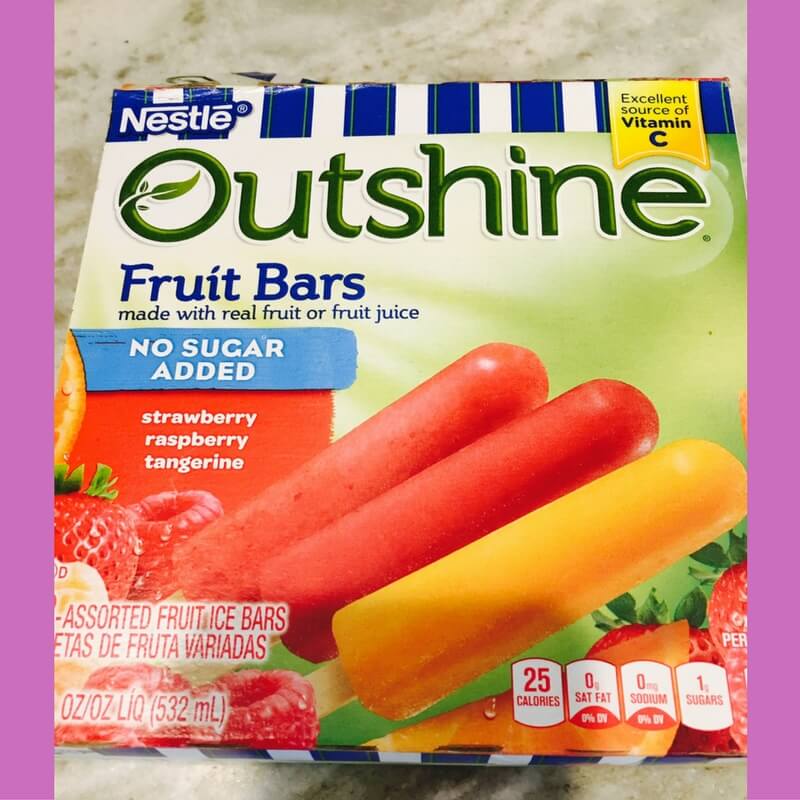
How do I count the many ways I love No-Sugar Added Outshine Bars ?!? The reasons are endless but below are just a few
Made with real fruit
Excellent source of Vitamin C
No high fructose corn syrup
25 to 30 calories
No sugar added
Only 6 – 7 grams of carbohydrates per bar
No artificial colors or flavors
While most low-sugar/no-sugar frozen fruit bars are somewhat tasteless – Outshine Bars taste super juicy! I am not sure how they pack so much flavor for only 25 calories! It is crazy. If you are looking for a low calorie, low sugar and low carbohydrate frozen treat that is PCOS friendly – then Outshine Bars are the answer.
Halo Top Light Ice Cream
Another of the PCOS friendly snacks I am LOVING this summer is Halo Top Light Ice Cream. While I have only tried the Vanilla Bean flavor I have to say I was very impressed.
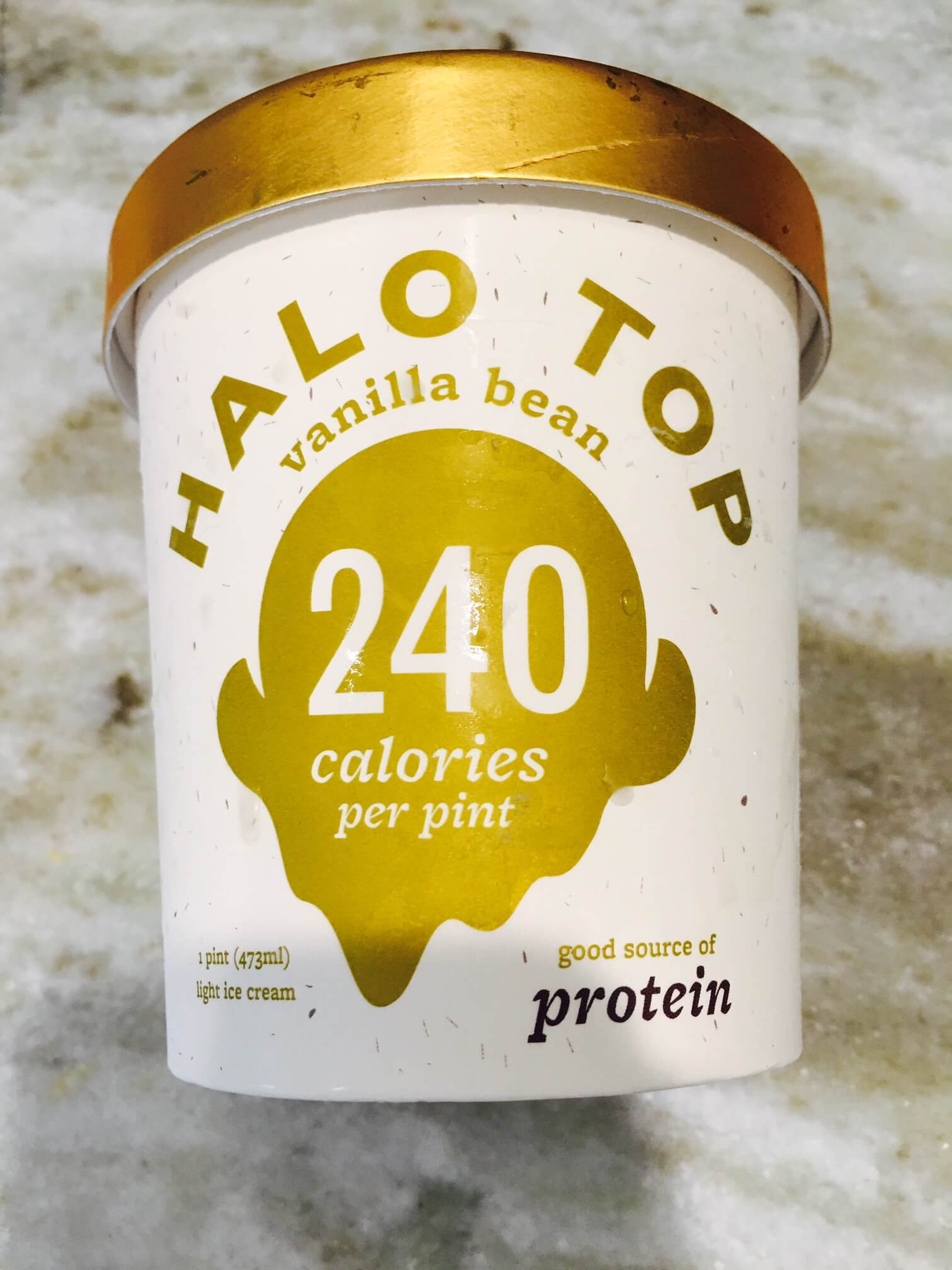
Halo Top Light Ice Cream claims, ” Finally healthy ice cream, that really tastes like ice cream.” And I have to agree! The consistency was smooth and you could really taste the distinct taste of the vanilla bean. It was not watery like Arctic Zero or Wink – two other low calorie frozen desserts that masquerade as ice cream. Halo Top comes in a range of flavors. Here is a list of all their awesome flavors — including ones “Birthday Cake” and “Chocolate Mocha Chip.” Yum!
Nutrition wise the profile is pretty hard to beat! Halo Ice Cream comes in pint sized containers (just Ben and Jerrys!) and seems to be located with the speciality ice creams and gelato in the grocery store. For the pint at Shop Rite I paid $3.65 and it was on sale. Regular price for the pint was around $4.99 – which for 4 servings is pretty pricey! I have seen it in most grocery stores including Whole Foods. With only 60 calories per 1/2 cup (that’s a serving!) that is about one third of the amount of calories as regular ice cream.
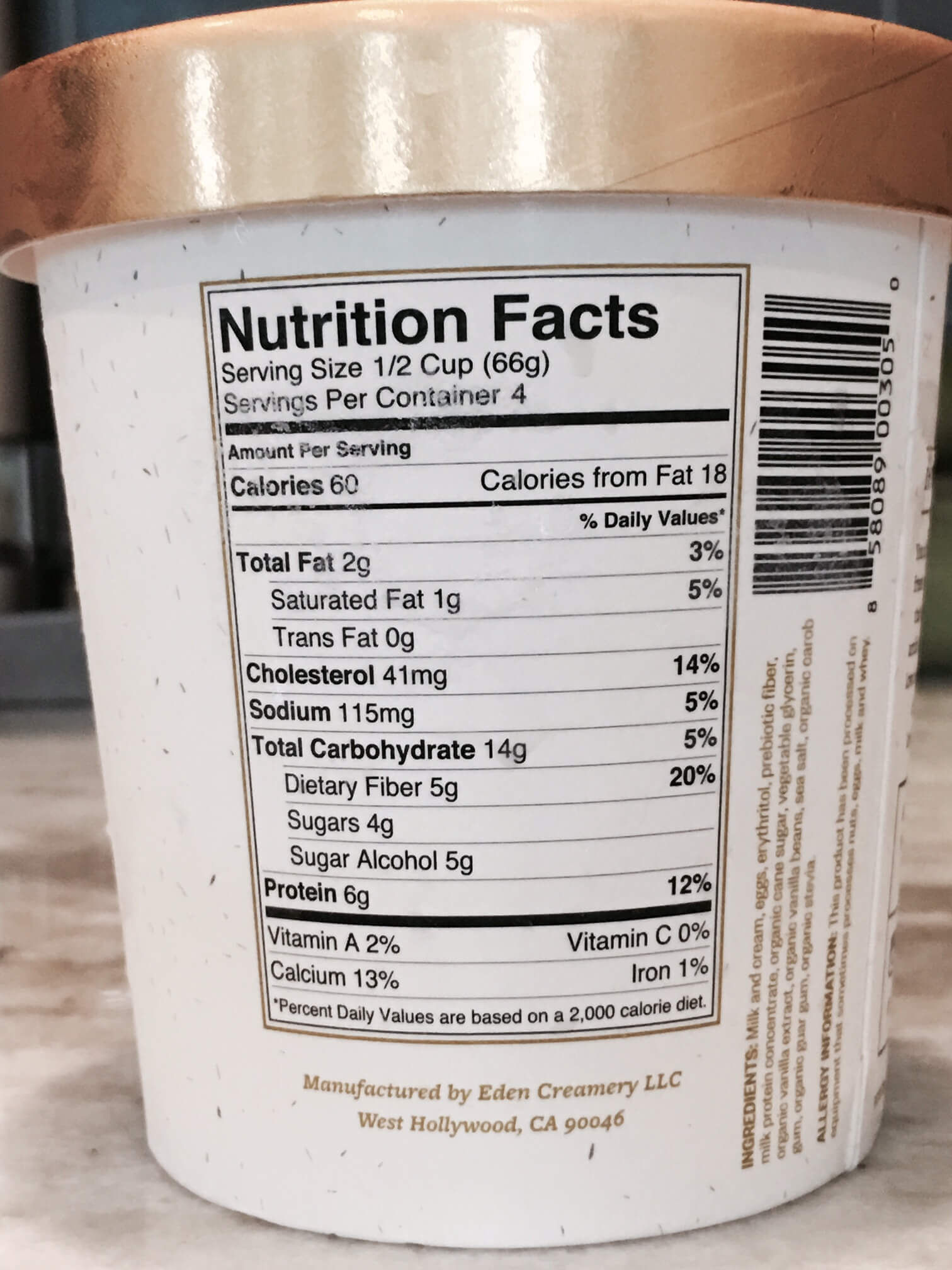
Below is a breakdown of Halo per pint and per 1/2 cup serving:
- Protein: 24 grams/6 grams
- Fat: 8 grams/2 grams
- Total Carbs: 56 grams/14 grams
- Fiber: 20 grams/5 grams
As you can see Halo Top fits the profile of our PCOS friendly snacks. It is low in carbohydrates (14 grams / serving), high in fiber (5 grams / serving) and it even contains a modest amount of protein (6 grams / serving). Most regular ice creams on the market are high in fat, while Halo only provide 2 grams per serving!
So Amy how do you classify PCOS friendly snacks? Great question my friend. My guidelines for snacks for women with PCOS is that each snack is around 100 – 150 calories and at or under 15 grams of carbohydrates. Halo Top ice cream fits the bill rather nicely. And … most importantly … it tastes pretty dang good!
So next time you are in the mood for something cold, low in carbohydrates and tasty — get your little butt to the store and pick No Sugar Added Outshine Bars and a pint of Halo Top ice cream and you are good to go! You can thank me later ♥ ♥ ♥
I would LOVE to hear whether you are digging or not digging these treats. What did you love most about them most? Let us know in the comments below. XoXo


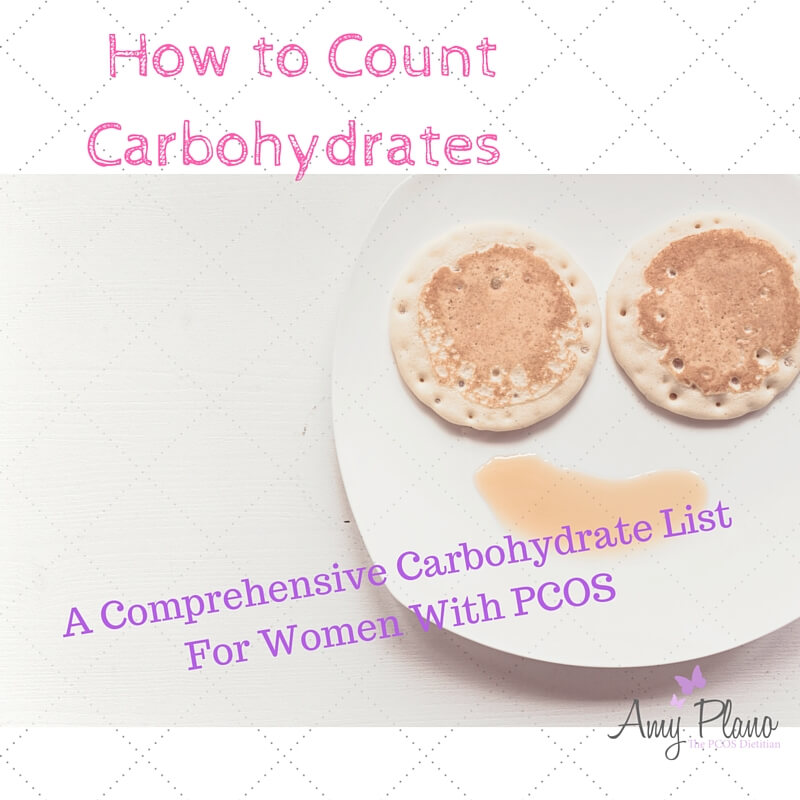
by AmyPlano | Jul 23, 2016 | General information about PCOS, PCOS and carbohydrates, PCOS Breakfast Foods, PCOS snacks, Weight Loss
Hi Everyone –
This will likely be one of my longest posts – but I think one of the most resourceful blogs! One of the questions I get asked a lot is, “How do you determine how many carbohydrates are in specific foods?” We can always read the label. But what happens if our food (or beverage) doesn’t have a label? Like champagne! Champagne does not have a label right? [Side note – if you want to be in the know on the carbohydrate content of all alcohol click HERE to get the 411. I wrote a killer blog on this very topic!] Well, that is why exactly I created this fancy guide to counting carbs for women with PCOS.
The ultimate guide to counting carbs for women with PCOS
If you have ever been in a PCOS nutrition session with me, you know I’m like a carbohydrate calculator. Throw any food my way and I can tell you how many grams of carbohydrates are in that particular food. But no worries if you’re not a freak show like me 🙂 That is a-okay!
I’ve created what I consider to be a comprehensive guide to counting carbs for women.with PCOS. This list should be awesome for any woman who has PCOS and is counting their carbs (Hint: if you have PCOS you should always being counting your carbs!)

This list is by no means all-inclusive – but I think I cover the majority carbohydrate containing foods most people eat. If a food is not listed — a great resource which I use all the time is www.calorieking.com . This website is awesome! You can download the app and have the carb count of all foods at the tap of a button! And extra bonus – it is FREE!
You have probably heard me reference that I often recommend a total intake of carbohydrate for most women with PCOS to be between 90 – 140 grams per day. You can use this list below to see how close you are coming within those targets. To be fair – I never count the carbohydrates that are in non-starchy vegetables. The only ones I do count are the starchy vegetables, peas, corn, potatoes and the winter squashes. All other vegetables have about 5 grams of carbs in each 1/2 cup.
Here you go! Enjoy The PCOS Dietitian’s guide to counting carbs for women with PCOS
The BEST guide to counting carbs for women with PCOS

Carbohydrate Content of Foods
BREADS / CRACKERS / GRAINS/ STARCHY VEGETABLES
* carbohydrate content may vary from brand to brand, always read the food label if there is one!
Starches Amount Carb grams
Breads
Bread, white or wheat 1 slice (1 oz) 15 g
Light bread 1 slice (1 oz) 7-8 g
Low Carb bread 1 slice (1 oz) 9 g
Challah 1 oz 15 g
Lavash, plain 2 oz 30 g
Pita bread, all types 2 oz 30 g
Mini/Pocket 1 oz 15g
Turkish/Middle Eastern 1 oz 15 g
Hamburger or Hot dog bun 1 bun 20 g
Dinner rolls 1 small 15 g
Sandwich roll 1 medium (2 oz) 30 g
Bagel 1 (Deli style) 60-70g
Mini bagel 1 (1 oz) 15 g
Croissant, plain 1 mini (1 oz) 15 g
1 medium (1 ½ oz) 20 g
1 large (2 ½ oz) 35 g
Danish, fruit 1 regular 30 g
Doughnut 1 medium 25 g
Pancake or waffle, frozen 1 small 15 g
English muffin, plain 1 30 g
Muffin, blueberry 1 small (2 oz) 30 g
Dunkin Donuts 1 regular 75 g
Tortilla, corn, 6” 1.2 oz, each 10 g
Soft Taco 1 15 g
Flour Tortilla 1 (1.7 oz) 30 g
Burritos Tortilla 1 30 g
Wraps, plain
Regular size 1 75 g
Large size 1 120 g
CRACKERS
Saltine 1 cracker 2 g
Cheese 1 crackers 2 g
Graham 1 cracker 5 g
Wheat Thins 1 cracker 1 g
Soda 1 cracker 10 g
Peanut Butter 1 cracker 4 g
CEREALS
Oatmeal 1 cup (cooked) 30 g
Farina 1 cup (cooked) 25 g
Dry Cereal 1 cup 22 – 45 grams
GRAINS
Rice, white or brown 1 cup (cooked) 45 g
Spaghetti 1 cup (cooked) 40 g
Elbows/spirals 1 cup (cooked) 40 g
Small Shells 1 cup (cooked) 30 g
Mac & Cheese 1 cup (cooked) 30 g
Grits 1 cup (cooked) 30 g
STARCHY VEGETABLES
Corn ½ cup 15 g
Corn on the cob 1 medium 20 g
Popcorn 3 cups 15 g
Potatoes
Plain, baked small (3 oz) 15g
Wendy’s, baked large 60-70g
Mashed ½ cup 15g
Plantain 1 medium 30 g
Yam ½ cup (mashed) 15 g
Yucca ½ cup (mashed) 15 g
Hash brows ½ cup (mashed) 10 g
French Fries
McDonald’s small 25 g
medium 60 g
large 70 g
Restaurant style 15 fries 25 g
BEANS
Beans, dry:
Black-eyed peas 1 cup (cooked) 30 g
Lentils or peas 1 cup (cooked) 40 g
Navy beans 1 cup (cooked) 45 g
Pinto or Black beans 1 cup (cooked) 45 g
Beans canned:
Backed in sweet sauce 1 cup 50 g
Black or Kidney beans 1 cup 40 g
Chili with beans 1 cup 30 g
Garbanzo beans 1 cup 50 g
Lima beans 1 cup 30 g
Refried beans 1 cup 40 g
FRUIT/ FRUIT JUICES
* Use a Food Scale to measure carbohydrate content of fruit per amount (oz.)
Food Amount Carb grams
FRESH FRUIT
Apple
Small 4 oz * 15 g
Medium 6 oz 25 g
Large 8 oz 35 g
Apricots 1 medium (2oz) 6 g
Applesauce ½ cup unsweetened 15g
Banana
1 medium 5 oz 20 g
1 large 7 oz 25 g
Berries 1 cup 20 g
Cantaloupe/Honeydew 1 oz 2 g
1 cup (cubes) 15 g
Cherries 10 pieces 10 g
Clementine 1 medium (3 oz) 15 g
Grapefruit ½ fruit 15 g
Grapes 15 pieces 15 g
Kiwifruit 1 medium (3 oz) 10 g
Mandarin 1 small (3 oz) 6 g
Oranges
Small 1 (5 oz with skin) 12 g
Medium 1 (7 oz) 18 g
Papaya ½ cup (cubed) 8 g
Medium 1 (with skin) 30 g
Peaches 1 medium (4 oz) 8 g
Plum 1 small (2 oz) 6 g
Pear 1 medium (6 oz) 22 g
Pineapple 1 thick slice (3 oz) 10 g
Strawberries 1 cup (sliced) 10g
3 large (2 oz) 3 g
Watermelon 1 cup cubes 12 g
CANNED FRUIT
(check the label!)
DRIED FRUIT
Apricots 8 halves (1 oz) 15 g
Prunes 3 medium 15 g
Raisins 2 Tbsp. 15 g
FRUIT JUICE
Apple juice 4 oz (1/2 cup) 15 g
Grape juice 4 oz (1/2 cup) 20 g
Orange juice 4 oz (1/2 cup) 12 g
Vegetable juice 4 oz (1/2 cup) 6 g
MILK / YOGURT
Food Amount Carb grams
MILK
Whole, low-fat or skim 8 oz (1 cup) 12 g
Chocolate milk 8 oz 26 g
Soymilk (plain) 8 oz 8-10 g
YOGURT
Plain yogurt 8 oz (1 cup) 12-14 g
Light yogurt 8 oz 16-20 g
Fruited yogurt 8 oz 32-40 g
Greek yogurt (plain/non-fat) 6 oz. 7-10 g
Greek yogurt (plain/ 2%) 6 oz 7-10 g
Greek yogurt (flavored/non-fat) 6 oz. 8-35 g
CONDIMENTS / SWEETENERS
Food Amount Carb grams
SUGARS
Table sugar 1 Tbsp 15 g
Honey 1 tsp 6 g
Jam or preserve 1 Tbsp 15 g
Syrup, Regular 1 Tbsp 15 g
Syrup, Light 1 Tbsp 7 g
BBQ sauce 1 Tbsp 6 g
Ketchup 1 Tbsp/ 1 pkt 5 g
Spaghetti sauce ½ cup 10 g
Cranberry sauce ¼ cup 25 g
FAST FOODS
* Ask for nutritional information where you buy/eat fast food
New York style pizza 1 slice 45 g
As I noted I am sure I missed a couple of foods. But I did my best to provide you with a comprehensive guide to counting carbs for women with PCOS . Let me know in the comments below if I missed any of your favorite carbohydrate containing foods. I would love to know. Bet your eyes are better than mine! ♥



by AmyPlano | Jul 19, 2016 | PCOS and carbohydrates, PCOS and metabolism, PCOS and Weight Gain, Truth Bomb, Weight Loss
Given the fact I have been successfully helping women with PCOS lose weight for the last decade, it is fair to say I have seen my fair share of diets. However, one thing I can tell is certain Weight Watchers and PCOS don’t mix!

Typically by the time most women find me, they have been struggling for quite some time with their weight. They have tried every diet out there with minimal success. I don’t think there has been one woman who has exited their initial visit with me not having an “ah-ha!” moment. When women leave my office, it’s often with a sigh of relief — like a load has been lifted off their shoulders. What they have been doing for so long has been so wrong — but they have been brainwashed to think that it is SO right. That folks is the true definition of frustration! No bueno!
PCOS and Weight Watchers: Why Weight Watchers is making you fat!
You see, most women with PCOS are SO confused when it comes to diet. And rightfully so! There is so much information out there — low fat, high fat, no gluten, no dairy, no salt, no carbohydrates. I’ve seen every diet out there. But if I were to say there is any one diet I see many PCOSers follow (or followed at some point in their weight loss journey!) is Weight Watchers. If there is anyone diet platform that is just so damn wrong for women with PCOS it is Weight Watchers. Yes, you heard me correcty! If you have PCOS, Weight Watchers is making you fat! Stop the presses — if you are following a Weight Watchers style diet – get the heck off of it now. Weight Watchers and PCOS do not play in the sand box nicely!
Let me tell you why.
Why Weight Watchers doesn’t work for women with PCOS
You see, Weight Watchers is a very high carbohydrate, moderate protein, low fat diet. Most of the programs created by Weight Watchers provide at least 60 % of the total daily calories from carbohydrates. For Pete’s sake — I don’t even feed my professional athletes that many carbohydrates! Most women with PCOS effectively lose weight when their diet is just around 30 – 40 % total calories coming from carbohydrates. For someone following a 1300 calorie diet, 40 % of your calories coming from carbohydrates would be < 140 grams per day. If you were following the same level calories (I know you don’t count calories on Weight Watchers – you count points – but bare with me sister’!) on a Weight Watchers plan would you would be taking in about 200 grams per day. As small as it sounds — these 60 grams of extra carbohydrates ARE NOT working for your waist line – not to mention how it is impacting your fertility and overall health.
Every time we consume carbohydrates of any kind (it doesn’t matter if it is fruit, oatmeal or a sweet potato!) our bodies break down the carbohydrates into glucose. In response to glucose your angry body dumps out the hormone insulin. Insulin is what we consider a storage hormone. This means when insulin is circulating in our blood system – our bodies do not break down body fat for fuel – but instead it goes into fat storage mode.

As many as 70 % of women with PCOS are insulin resistant. This means their bodies’ are resistant to the effects of insulin. Insulin resistance makes it very difficult for their bodies to process carbohydrates. That is why many women with PCOS take the medication Metformin. This miracle drug for women with PCOS makes their cells more sensitive to the effects of insulin. Therefore, Metformin allows them to break down carbohydrates more effectively. I say more effectively because even on a therapeutic dose of Metformin, say around 1500 mg/day, women with PCOS still tend to not thrive on a diet higher than 40 % total calories coming from carbohydrates. I think of PCOS like having a carbohydrate handicap – that even when medicated on Metformin — this handicap does not go away 🙁
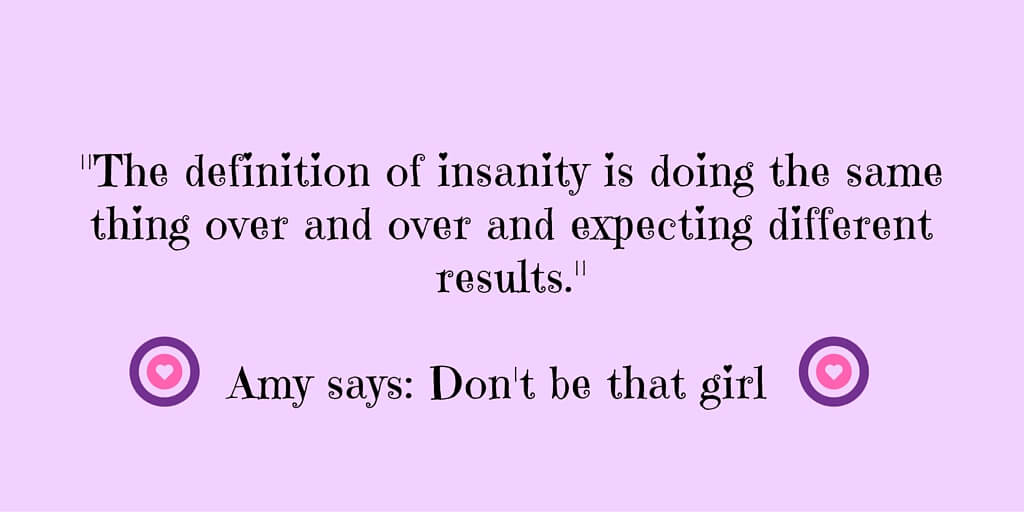
Stop the carbohydrate madness – just say heck ‘no’ to Weight Watchers and PCOS
Weight Watchers is the wrong weight loss program for women with PCOS
So back to Weight Watchers and why it could be responsible for making you fat if you have PCOS. On a typical Weight Watchers program you are eating carbohydrates all day. Breakfast — Special K Cereal (Carb) with Skim Milk (Carb) and fruit (Carb) Lunch – Turkey Sandwich (Carb) with pretzels (Carbs) and a yogurt (Carb) Dinner — Chicken, Sweet Potato (Carb) and broccoli. Snacks – Flavored Greek Yogurt (Carb), Apple (Carb), Skinny Cow (Carb). As you can see there is no shortage of carbohydrates. You mine as well be fueling for a marathon!
I want to make it clear – I have nothing against any of these foods. But for women with PCOS this style of eating creates an insulin disaster! All day long your body is getting flooded with carbohydrates that drives your insulin through the roof. Therefore, on a program like Weight Watchers you become a fat-storing machine – completely the opposite of what you want!
I think Weight Watchers is fantastic for many things – one being accountability. Also for many people it clearly works – and I cannot deny that! But I lie to you not – Weight Watchers is NOT the appropriate program for someone with PCOS trying to lose weight. I work with MANY women who actually gain weight while on a Weight Watchers program. If this is you — do not blame yourself. I bet you are spot-on with your points — it is just not the right program for you.
The right weight loss diet for women with PCOS
Women with PCOS need to follow a modest, lower carbohydrate diet to promote and sustain weight loss. That isn’t the same thing as a no-carbohydrate diet or a low-carbohydrate diet (< 20 grams per day). No need to be so drastic. So please don’t get these terms confused. Most women do well when their carbohydrates are between 90 – 140 grams per day.
In future blog posts, I’ll discuss what a typical day looks like at these carbohydrate levels. But in the meantime if you are hanging with the ladies at Weight Watchers and you have PCOS, please promise me you will cut your ties?
I’m only saying this for your own good – I promise.
Got questions on why Weight Watchers could be making you fat if you struggle with PCOS? Please post them in the comments below. I would love to hear your thoughts.
























